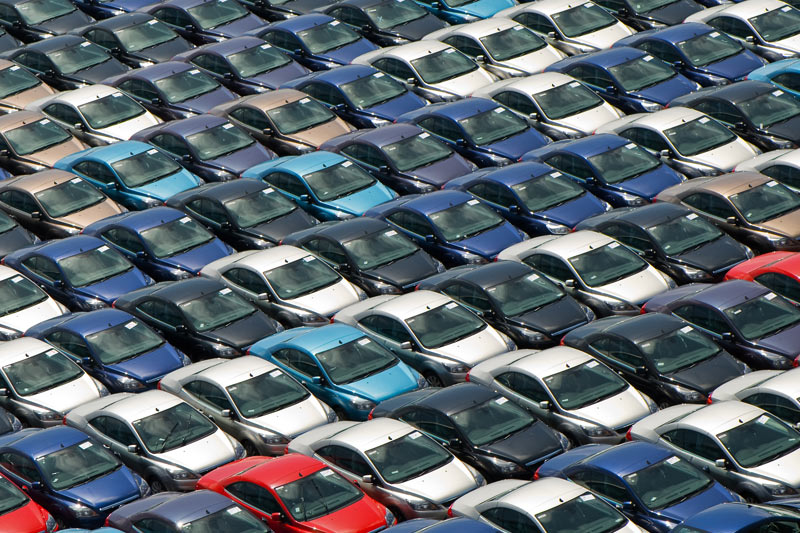By Laurence Frost and Andreas Cremer
PARIS/BERLIN (Reuters) - Berlin-based PR executive Herbert Franz should be a soft target for German luxury automakers - his last car was a BMW (DE:BMWG) X3 - but he can't wait to leave them behind.
"This car is hip," said Franz, 52, at the city's biggest Jaguar Land Rover (NS:TAMO) showroom, while eyeing up a British-built Evoque SUV that he fully intended to purchase.
Decked out in bright red blazer and canary yellow trousers, Franz might not be the typical customer in Germany's conservative premium market. But his shifting taste in cars foreshadows less comfortable times ahead for global leader BMW, as well as Audi (DE:VOWG_p) and Mercedes-Benz (DE:DAIGn).
The German premiums have long been on a roll, producing an export-driven sales explosion and huge returns while mass carmakers struggled through Europe's crisis.
But in a headlong sales race, second-placed Audi and runner-up Mercedes have both vowed to depose BMW, giving rise to heavy discounting, which sullies luxury brands and creates opportunities for the growing competition, observers say.
Now a host of younger or revived premium marques are poised to follow JLR by pitching dozens of new models against the big three, whose very ubiquity is taking the shine off their prestige.
"The German premiums have sacrificed some of their exclusivity by entering smaller, volume segments like compacts," said Bernd Hoennighausen, an automotive consultant.
"They've pushed volume with fleet discounts of around 20 percent," said Hoennighausen, who previously managed corporate fleets for Deutsche Bank and BNP Paribas.
"This may open the door to newer players like Jaguar, who are starting to offer fleet-relevant products."
Among others waging or planning new offensives are Fiat-owned (MI:FIA) Maserati and Alfa Romeo, Nissan's (T:7201) Infiniti, and Volvo, a unit of China-based Geely (HK:0175).
"Our theory is that there's room for something visibly different that is styled in a more provocative manner," said Andy Palmer, the senior Nissan executive charged with achieving a breakthrough for the 25-year-old Infiniti brand.
"It's particularly true for China," Palmer told Reuters. "Chinese consumers will cross-shop - and Audi only has the market to lose because they've been so dominant."
For now, the Germans remain firmly on top. Their combined sales amounted to 4.7 million vehicles last year, almost 60 percent of the global luxury car market, according to consulting firm IHS Automotive.
That represents a 38 percent gain since 2007, the eve of the financial crisis, when the big three claimed just over half of the market. Global car sales grew 21 percent overall, while European demand shrank by a quarter over the period.
TURNING TIDE
Superior scale also brings cost advantages - from research to production and marketing - that are not going away. BMW has led the charge into new niches, launching dozens of models including SUVs in every size category, with Audi close behind.
Nonetheless, some analysts believe the tide is beginning to turn against the Germans.
UBS expects the same group of challengers, plus Tesla's (O:TSLA) zippy electric cars and DS models from PSA Peugeot-Citroen, to grab 30 percent of global premium sales growth in 2014-18, raising their current 12.5 percent market share.
Pressured by the increasing competition, the Germans' return on invested capital will continue falling away from historic peaks of around 30 percent in 2010-2012, the bank predicts.
"There's also an inherent contradiction between premium and concentration," UBS analyst Philippe Houchois said. "Buyers of premium-branded cars are looking for some degree of exclusivity that will set them apart from less fortunate car owners."
The resulting market fragmentation is "bringing the curtain down on the unprecedented growth ... that enabled premium auto manufacturers to generate outsized returns", he added.
BMW shares are up 5.4 percent this year, beating the wider European auto sector's 0.4 percent slide . But Daimler is 1.1 percent lower and VW down 15 percent, hit by cost overruns.
Louis Alexandre de Froissard, a Bordeaux-based private wealth manager, gave up his Audi A8 for an Infiniti Q50 hybrid that delivers 364 horsepower while emitting 144 grams of CO2 per kilometer, comfortably below a 160 gram French tax threshold.
By comparison, BMW's 7-Series hybrid gets 320 horsepower for 158 grams of CO2. Froissard also ruled out the Audi A6 Avant, which puffs a penalty-prone 190 grams for just 310 horsepower.
"It wasn't powerful enough," he explained, and besides, "everybody's got an Audi or a BMW - so Infiniti was a much more original choice".
BMW's sleek i8 is among belated German steps to plug the hybrid gap after a period of complacency. On the broader sales and pricing rivalry there are also some signs of circumspection.
"We have to find the right balance between volume and pricing," CEO Norbert Reithofer told analysts on Aug. 5.
"We (realised) in December that if you reduce your volume, you can even have a better profit," the BMW boss said on a conference call, adding that a "thinking process" was underway.
CFO Friedrich Eichiner even described the new stance as a "message to the competition", but Audi and Mercedes may still be too intent on overtaking to take the hint.
"Volume is indispensable," Audi boss Rupert Stadler told Reuters on July 8. "Only when you grow you have a chance to make gains on productivity."
With leadership successions due within two years at all three German luxury carmakers, any deeper tactical change may have to wait, ISI analyst Ellinghorst believes.
"It may be easier for those in charge today to continue to ride the volume train," he said, "leaving the more difficult and political task of improving pricing to new management teams."
($1 = 0.7541 euro)
(Additional reporting by Edward Taylor, Costas Pitas and Irene Preisinger; Editing by Will Waterman)
